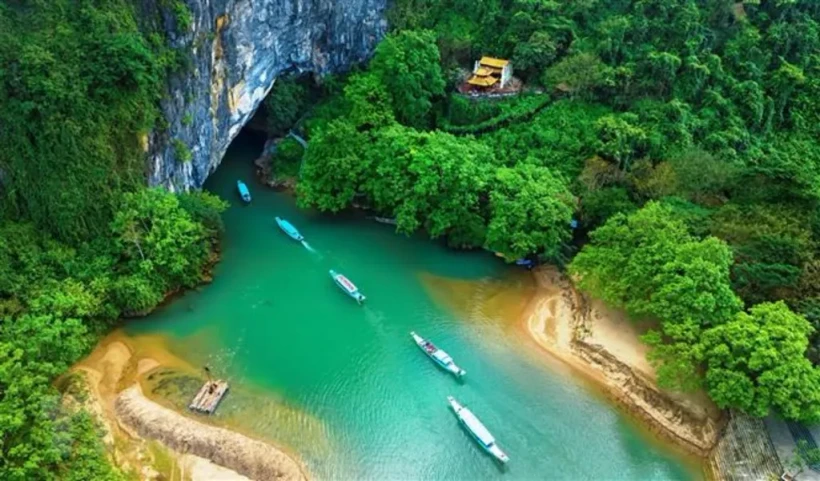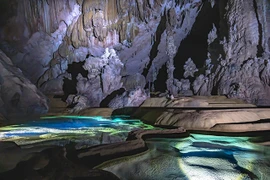Quang Binh (VNS/VNA) - Lonely Planet has introduced Phong Nha-Ke Bang National Park, Son Doong Cave, Tu Lan Cave, and Thien Duong Cave as must-see attractions in Vetnam’s central province of Quang Binh.
The world largest and prestigious travel guide book publisher wrote: "Designated a UNESCO World Heritage Site in 2003, the remarkable Phong Nha-Ke Bang National Park contains the oldest karst mountains in Asia, formed approximately 400 million years ago.
"Riddled with hundreds of cave systems – many of extraordinary scale and length – and spectacular underground rivers, Phong Nha is a speleologists’ heaven on earth, and a real treat for anyone who appreciates the sight of nature at its most raw.
"The caves are the region's absolute highlights, but the above-ground attractions of forest trekking, the area's war history and rural mountain biking means the park has enough going on to warrant stays of up to three days."
The park’s landscape is formed by limestone plateaux and tropical forests, covering a total surface area of 123,326ha. It contains and protects over 300 caves and underground rivers. A variety of cave types including: dry, terraced, suspended, dendritic and intersecting caves.
Typical ones should be gigantic En, little wonder Toi, spiral-shaped Tien and gorgeous Va.
Son Doong (Mountain River), located in the heart of Phong Nha-Ke Bang National Park, is known as the world's largest cave.
Lonely Planet says it is one of the most spectacular sights in Southeast Asia and also one of the most exclusive.
This enormous cave was discovered quite recently and only confirmed as the world’s biggest cave by British explorers in 2009.
The cave (more than 5km long, 200m high and, in some places, 150m wide) is big enough to accommodate a battleship. Sections of it are pierced by skylights that reveal formations of ethereal stalagmites that cavers have called the Cactus Garden.
Some stalagmites are up to 80m high. Cavers have also discovered colossal cave pearls measuring 10cm in diameter, which have been formed by millennia of drips, fusing calcite crystals with grains of sand. Magnificent rimstone pools are present throughout the cave, plus rivers that are ideal for swimming.
The Tu Lan cave system is located in the primeval forest and limestone mountains with an area of more than 650ha. The area, explored in 1992, covers eight different valleys and mountain ranges connected by an underground river and more than twenty wet and dry caves, which are thought to be between three and five million years old.
Huge caverns, underground rivers and vast dangling stalactites make the caves a big draw for spelunkers while and the stunning landscape captures the Hollywood's attention. Tu Lan was picked to be a backdrop in blockbuster Kong: Skull Island in 2017.
Surrounded by forested karst peaks, staggering Thien Duong (Paradise) cave system in Phong Nha-Ke Bang National Park extends for 31km, though most people only visit the first kilometre.
"The scale is breathtaking, as wooden staircases plunge into a cathedral-like space with vast alien-looking stalagmites and stalactites illuminated by large flood lights. Get here early to beat the crowds, as during peak times (early afternoon) tour guides shepherd groups using megaphones," Lonely Planet said.
It is the first time that a locality of Vietnam has made it into a must-see in Lonely Planet.
Previously, the website ranked Phong Nha-Ke Bang one of five dream destinations for 2019./.




























